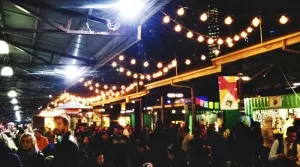Spending (And Saving!) a Semester in Melbourne


Flat white from the coffee shop down the street. Bowl of pho at the Queen Victoria Market. Fully loaded myki card for use on public transportation. Another flat white from a different coffee shop. Pair of boots from a consignment store on Flinders Street. Yet another flat white.
The above is part of a list of what I’ve recently bought. I’ve only been living in Melbourne about two weeks now, but it’s already safe to say that there’s no shortage of goodies and services on which to spend money. That shouldn’t come as a surprise: Melbourne is the culture capital of Australia (not to mention its coffee capital as well), filled with museums, markets, munchies, and music galore. Hidden down graffiti-covered “laneways,” you’ll find everything from vintage record stores to modern boutiques and more.
When I first visited Melbourne’s CBD (Central Business District) I was transfixed by the amount of things I wanted to buy. Once I saw their prices, however, my fixation turned into hesitation. It became clear that saving cash was going to be more difficult than I’d originally anticipated. Add to this the pressure (either from others or just from myself) to go out frequently, and I had a recipe for potentially reckless spending: club cover charges, a few drinks, and an Uber-ride home a couple of times a week can take a major toll on your wallet.
But “having fun” and “breaking the bank” don’t have to be synonymous; in fact, there are many ways of saving money (or even making money!) while studying abroad.
Prioritize Your Purchases
If I were to go window shopping down Melbourne’s trendiest streets and buy everything I liked without hesitation, I’d probably blow through my budget in minutes. In this case, your best bet for saving is to make a list of what you’d love to buy or restaurants you want to try before you leave. As time passes, you might find that not all of those things or places sound quite as alluring as they initially did. Go back and indulge (responsibly) on the ones that stay stuck in your mind.
Speaking of “going back,” going back and forth from uni to the CBD can quickly drain your myki card. (A quick briefing: myki cards are used for payment on Melbourne’s public transportation. Instead of giving an individual ticket for each ride, travelers simply tap on their cards when entering trams/trains/busses and the fares are removed automatically.) When each ride costs nearly $4.00, a few jaunts to the city each week can cost a small fortune.
If possible, walk to campus and to the CBD (or, at least, to the Free Tram Zone in the CBD). Melbourne is also very bike-friendly, and bicycles are available for rent or for purchase from many secondhand shops. Both walking and biking are fabulous ways to get to know the nooks and crannies of the city that you might miss while taking public transportation. Plus, they help you stay fit, saving you money on a gym membership!
Working for the Weekend
While some might associate studying abroad with play rather than work, living in a new country can provide excellent opportunities for those seeking a job. Kaysie Tam, a fellow IFSA-Butler student, plans on finding work as a barista (which, in a coffee-loving city like Melbourne, should be easy). “I know that minimum wage is higher here,” Tam said, “so I thought it’d be a good way of saving money.”
She’s right. Even when factoring in the exchange rate from Australian to U.S. dollars, Australia’s minimum wage is higher than what you’d make in the States. Being employed abroad might not sound exhilarating, but consider all the locals you’ll meet and friends you might make on the job.
If you’re keen about working on projects, you can always apply for a Work-to-Study position with IFSA-Butler. Job titles include health and safety advisor, photographer, peer advisor, international correspondent (like me!), and more.
“Having fun” and “breaking the bank” don’t have to be synonymous; in fact, there are many ways of saving money (or even making money!) while studying abroad.
Finding Fun That’s Free (or Cheap!)
Not every entertaining activity needs to be expensive (or cost anything, really). There are heaps of websites dedicated to finding free events in Melbourne. Add their dates to your calendar so you don’t miss any of the action.
From beautiful galleries to beach boardwalks, Melbourne and its suburbs have a lot to offer travelers on a budget. So far, my friends and I have gotten lost in laneways looking at street art, have strolled through the Royal Botanic Gardens, and have taken a cheap train ride to hike in the Dandenong Ranges. Visit Victoria, the state’s official website, has a sizable list of free attractions that can easily fill up any time you have outside uni.
Inside uni, there’s even more to do — and I don’t mean coursework! The University of Melbourne is home to an extensive array of student clubs and societies. Whether you’re a lover of coffee, Chinese culture, community service, chess, or calligraphy (plus much more), you’re bound to find a group that shares your interest at UniMelb. These clubs tend to be active on campus, holding free or inexpensive events for their members.
Before your schedule gets too hectic, remember that IFSA-Butler also puts together excursions throughout the semester. Our group will be attending a rousing game of footy, sightseeing along the gorgeous Great Ocean Road, learning to surf, and more. It’s definitely worthwhile to take advantage of the many immersion activities IFSA-Butler offers.
Can living abroad in Melbourne be expensive? Yes. But are there still things to do and places to see that will make you — and your wallet — happy? Absolutely.